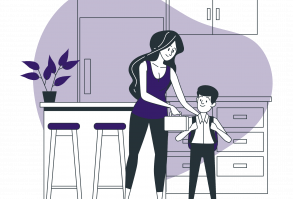From my conversation with my decade-long friend, I was reminded that sometimes it may seem like you have a war going on in your family—with you on one side, and your kids on the other? Many parents feel like they live in the middle of a battle zone and that at any given moment they might step on a landmine. Your little cutie pie that would giggle at just your presence now has an opinion. At around the age of 3-5, your child’s emotions are rapidly developing. During these two years your child really starts to understand that his body, mind and emotions are his own. He now understands the difference between feeling happy, sad, afraid or angry.
He may seem to be just difficult – refusing to do as he’s told, making a big deal out of small things like washing hands or taking a nap. This is just a phase. As he gets more confident, he’ll also get better at handling his emotions.
When my second born daughter Ella got to this stage, she was driving all of us up the wall. She was battle ready all the time. We even started an experiment with my first daughter who was a decade older than her. We noted that Ella was not doing what she felt was right but what she felt was opposite of what we asked. So we would tell her to come and she would go and vice versa.
What can you do for him?
Stop dictating – instead give him understanding
After some experimental strategies, we realized that we were treating Ella as a baby when she was feeling like an adult. Instead of ordering her to go wash her hands, we started to give her understanding how germs work. Thank God with the easy access to information from the internet, you can find appropriate place to start with your child. Show them pictures of germs, show them how they get to the hands and finger nails and show them how we transfer them to the mouth and to the stomach when we don’t wash hands. Then crown it with how painful it is to have a stomach bug. If you do it daily for a few days, lesson is embedded in their minds forever.
After this, instead of asking her to wash her hands, we would ask her if she wanted to keep the germs and get a tummy ache? Alternatively, she could wash her hands with soap and kick the germs off her hands and get to enjoy tummy ache free time which she can then use to play longer or hang out with friends.
Teach him to discuss solutions and solve problems
Human beings are prone to doing things in a particular way. My most humorous moments is when I am driving my car with another experienced driver in the passenger’s seat. The best moment is when I need to park it in or out. There are several options I could do it. But I always do it my way – not that it’s a better way than another person’s way. It’s just the way I do things.
Now think of your 3-4 year old. He is starting to develop his way of doing things. You have called him to go wash his hands or clear the toys after playing with them. You would prefer that he stops everything he was doing and get right into obediently doing what you said. In his mind, he could be thinking how he might want to finish building that tower then do what you have said.
This is a perfect opportunity for you to allow him to discus with you possible solutions or to solve the problem at hand. I always give a heads up to my kids – it’s not a guarantee that it will work but over time, they get it. “You will need to clear the toys in five minutes (so that we can get dinner started or set up the table”) – give understanding. You might need to do this several times to get desired results.
Sometimes I even plan a whole 5 hours ahead. I will let my kids help me to plan the time so we agree that they will play for one hour, then they will need to clear the toys and put them away, then they will need to take a shower, then we will have family devotions, then we will set up the table, then we will have dinner, then they will brush their teeth, then we will go to bed, then we will wake up tomorrow and have breakfast together. This way, when I mention it’s time to transition to the next activity, there is less resistance.
Be careful on how you react
Your child is watching to see how you react. At this stage, getting all the attention is very critical especially if there are other smaller siblings in the picture. If by throwing a tantrum gets him the attention of all the adults in the home, then that will do for him.
If adults also yell, embarrass, or shame, you also empower them to do the same. His understanding will be that when people get frustrated, they should throw tantrums.
In the stead, you should keep calm. Kids watch how adults behave and act when they are mad, disagree with something or are offended. Being calm under pressure and exhibiting self-control sets a positive example. You should talk with your kids about situations in which you felt angry and what steps you took to calm down.
Be a positive role model
Kids learn best by observation and not by what you tell them. You must serve as a role model in the behaviours you want to enforce. Set the example of expected behaviour at all times. Remember, your kids are watching!
For my family, we would start with, “Daddy to go wash his hands. Mommy to go wash her hands. Big sister to go wash her hands. Small sister to now go wash her hands. And tomorrow we will start with the small sister and go up to daddy, yaaay!”
When your kids see that the instructions are not only for them but everyone in the family follows them, they become more acceptable. This also works for potty training – let your child know that you have gone to the washroom and state exactly what you are going to do there.
Praise him and provide positive reinforcement
Praise works wonders in helping to build positive child behaviors. The key point is to ignore tantrums and then to lavish attention when he follows instructions given. Children will quickly get the hint that good behaviours get them more attention than negative ones.
In my family, we would even call a family meeting to just report what our four year old son, Ethan, has done. “Daddy, can you imagine that after Ethan touched dirt outside, he run into the washroom and washed his hands with soap and a lot of running water? He did not even waste the hand wash gel, he just put the right amount.” Then daddy responds, “What? Amazing! Let’s all clap for Ethan.” We have this song we sing for everyone – for mommy when she cooks good food; for daddy when he leads the devotions very well; for Abiah when does the dishes; for Ella when she plays with her little brother well; and also for Ethan when he washes his hands.
Well done, well done,
try again another day,
God is working on your heart or skill!
Above all, remember that this phase shall pass also.
What can you do for yourself?
Being a parent can sometimes feel like you are living a relentless life where you don’t belong to yourself anymore; you give your love and energy away, every moment of your existence, and can’t figure out how to keep any for yourself.
Take a break every so often
Not because you work harder. You need a few minutes to not be on edge, working your nerves and spirits raw for the safety and happiness and health of your kids. You just need a moment to remember who you are, to not feel worried and harried and invisible. You need a second to catch your breath, to make your own choices, to try to love yourself, for a moment. You need that opportunity to exist, as a human being with a name and thoughts and ideas; as a person who is allowed to complete a thought. We need to be allowed to drive a car and use the bathroom without being pulled away and pressured. We just need a moment, or we’re going to fall apart.






